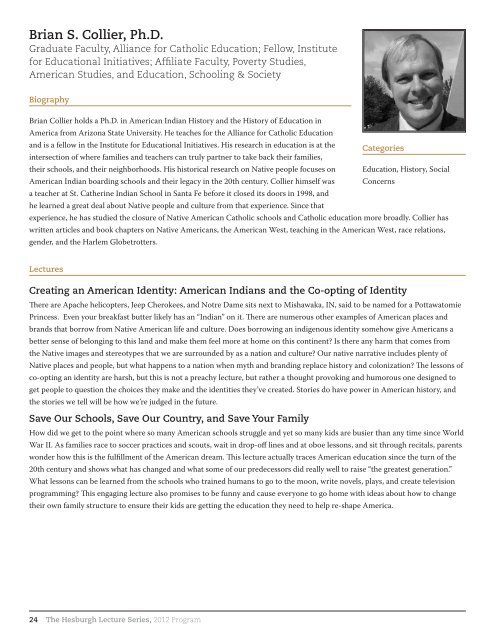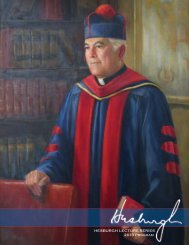HESBURGH LECTURE SERIES 2012 Program - Alumni Association ...
HESBURGH LECTURE SERIES 2012 Program - Alumni Association ...
HESBURGH LECTURE SERIES 2012 Program - Alumni Association ...
You also want an ePaper? Increase the reach of your titles
YUMPU automatically turns print PDFs into web optimized ePapers that Google loves.
Brian S. Collier, Ph.D.<br />
Graduate Faculty, Alliance for Catholic Education; Fellow, Institute<br />
for Educational Initiatives; Affiliate Faculty, Poverty Studies,<br />
American Studies, and Education, Schooling & Society<br />
Biography<br />
Brian Collier holds a Ph.D. in American Indian History and the History of Education in<br />
America from Arizona State University. He teaches for the Alliance for Catholic Education<br />
and is a fellow in the Institute for Educational Initiatives. His research in education is at the<br />
Categories<br />
intersection of where families and teachers can truly partner to take back their families,<br />
their schools, and their neighborhoods. His historical research on Native people focuses on Education, History, Social<br />
American Indian boarding schools and their legacy in the 20th century. Collier himself was Concerns<br />
a teacher at St. Catherine Indian School in Santa Fe before it closed its doors in 1998, and<br />
he learned a great deal about Native people and culture from that experience. Since that<br />
experience, he has studied the closure of Native American Catholic schools and Catholic education more broadly. Collier has<br />
written articles and book chapters on Native Americans, the American West, teaching in the American West, race relations,<br />
gender, and the Harlem Globetrotters.<br />
Lectures<br />
Creating an American Identity: American Indians and the Co-opting of Identity<br />
There are Apache helicopters, Jeep Cherokees, and Notre Dame sits next to Mishawaka, IN, said to be named for a Pottawatomie<br />
Princess. Even your breakfast butter likely has an “Indian” on it. There are numerous other examples of American places and<br />
brands that borrow from Native American life and culture. Does borrowing an indigenous identity somehow give Americans a<br />
better sense of belonging to this land and make them feel more at home on this continent? Is there any harm that comes from<br />
the Native images and stereotypes that we are surrounded by as a nation and culture? Our native narrative includes plenty of<br />
Native places and people, but what happens to a nation when myth and branding replace history and colonization? The lessons of<br />
co-opting an identity are harsh, but this is not a preachy lecture, but rather a thought provoking and humorous one designed to<br />
get people to question the choices they make and the identities they’ve created. Stories do have power in American history, and<br />
the stories we tell will be how we’re judged in the future.<br />
Save Our Schools, Save Our Country, and Save Your Family<br />
How did we get to the point where so many American schools struggle and yet so many kids are busier than any time since World<br />
War II. As families race to soccer practices and scouts, wait in drop-off lines and at oboe lessons, and sit through recitals, parents<br />
wonder how this is the fulfillment of the American dream. This lecture actually traces American education since the turn of the<br />
20th century and shows what has changed and what some of our predecessors did really well to raise “the greatest generation.”<br />
What lessons can be learned from the schools who trained humans to go to the moon, write novels, plays, and create television<br />
programming? This engaging lecture also promises to be funny and cause everyone to go home with ideas about how to change<br />
their own family structure to ensure their kids are getting the education they need to help re-shape America.<br />
24 The Hesburgh Lecture Series, <strong>2012</strong> <strong>Program</strong>



